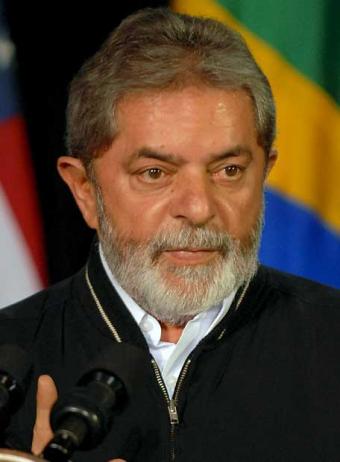
MOSCOW LOSES BRAZIL SUBMARINE DEAL TO PARIS
Publication: Eurasia Daily Monitor Volume: 5 Issue: 27
By:

In 2007 Russia became the world’s second-largest arms exporter, exceeded only by the United States. As Moscow seeks out new markets, it is increasingly eyeing prospects in what Washington regards as its own backyard, Latin America. Moving beyond its long-standing contacts with Cuba to emerging markets such as Venezuela, the greatest potential prize remains Brazil, whose relations with Russia in the last several years have been steadily deepening.
Russian-Brazilian relations received a quantum boost in November 2004, when Russian President Vladimir Putin became the first Russian head of state to visit Brazil. During the visit a broad range of bilateral initiatives were discussed, including military ties. These built on Brazil’s defense minister Geraldo Quintao’s visit to Moscow in April 2002, Russian defense minister Sergei Ivanov’s official visit to Brazil in October 2003, and the subsequent visit to Russia by Brazil’s defense minister, Jose Viegas, in December 2003. Brazilian-Russian trade received an immediate boost, with 2005’s bilateral trade growing by 30% over its 2004 levels (www.kremlin.ru/events/chron/2004/11/79877.shtml).
While Putin and President Luiz Inacio Lula da Silva further deepened their ties during the G-8 summit in St. Petersburg in July 2006, in April then-Russian prime minister Mikhail Fradkov, deputy chairman of Russia’s Federal Military-Technical Cooperation Service, discussed military-technical cooperation.
Last year Rosoboronexport, Russia’s state arms export agency, participated in two armament exhibitions in Latin America; “Telexpo 2007” in March in Sao Paolo and “ExpoExercito 2007,” the International Land Forces Exhibition held in June in Caracas (www.roe.ru/roe_ru/vyst/roe_ru_vyst.html.) Russian armaments exports to Latin America now include Venezuela, with Russia selling weapons to (or negotiating with) Colombia, Bolivia, Mexico, and Chile. The stage was now set for Russia to attempt to capture a portion of Brazil’s arms imports.
In January Brazilian President Lula da Silva asked the National Congress to approve $5.6 billion for the country’s 2008 defense budget, a 53% increase over 2007 (O Estado de Sao Paulo, January 16). Critics worry that the massive increase in defense spending will divert money from Lula da Silva’s cherished social programs, designed to raise millions of Brazilians out of poverty.
Driving Brazil’s concerns are increased drug trafficking through its Amazonian regions, heightened tensions along its border with Colombia because of increased activity by FARC guerrillas, and a rising sense of the need to protect the country’s territorial waters, where substantial oil and gas reserves have recently been discovered.
Last November Petrobras, the Brazilian state-owned oil company, announced the discovery of Tupi Field, a giant oil zone 155 miles off the coast of Rio de Janeiro in the South Atlantic, estimated to contain 5-8 billion barrels of light oil. In January the Tupi discovery was followed by the announcement of the discovery of a second field, Jupiter, estimated to be similar in size to Tupi. According to current Brazilian Defense Minister Nelson Jobim, the discoveries increased the country’s need for a Brazilian nuclear-powered submarine to help discourage possible terrorist attacks against the offshore oil platforms to be built there.
Last month the nuclear submarine program survived the latest round of budget cuts, with Jobim reassuring, “It is all already agreed. Nobody is moving against the program, which this year will cost $74 million.” In total the Brazilian government has allocated about $567 million to its nuclear submarine program (Folha, January 31).
Seeking foreign weapons, Jobim recently visited France. His time in Paris was apparently successful, as on January 29 he announced that Brazil and France had agreed to have France establish a “technological strategic park” in Brazil, along with agreements “to advance the modernization of the Armed Forces” of Brazil, with discussions about the possibility of France constructing a nuclear submarine for the South American country, along with conventional submarines. Other topics discussed included joint helicopter production and efforts to restructure Brazilian forces along current French lines (Folha, January 30). If the deal is finalized, Brazil will purchase a French-built Scorpene-class submarine for $600 million, payable over 20 years. As an added bonus, France would also agree to transfer the relevant technology (Folha, January 28).
Departing France on February 2, Jobin flew to Moscow for a four-day visit, where he held negotiations with Russian Minister of Defense Anatoly Serdyukov. The agenda reportedly included discussions on nuclear submarine issues and the establishment of a facility in Brazil to service Russian military aircraft and, possibly, helicopters (Correio Braziliense, February 2). Eager to clinch the deal, Moscow reportedly offered Brazil a technology transfer to go along with its intended purchase of 36 Sukhoi-35s, along with possible participation in the Russian PAK-FA (Future Air Complex for Tactical Air Forces) T-50 program, Russia’s fifth-generation combat aircraft project, which already has Indian participation.
Russian hopes for an agreement on a possible nuclear submarine deal were dashed by Jobim’s observation that Brazil’s negotiations on the subject with France were already quite advanced. He subsequently suggested that the Russians were “scared” of the technology transfer issue (Folha, February 7). In the end, while no concrete agreements were finalized, the press chief for the Russian Space Forces, Colonel Alexei Kuznetsov, told journalists that Moscow views Brazil “as one of its most important partners in Latin America and attaches special importance to the improvement of Russian-Brazilian interaction in the military-technical sphere” (Itar-Tass, February 5). Kuznetsov added, “Between Russia and Brazil there are several directions of collaboration, including the training of Brazilian military personnel and accepting Brazilian military personnel in Russia’s Ministry of Defense educational institutions, deliveries of Russian military equipment to Brazil’s armed forces and modernization programs for the Brazilian army” (Gazeta.GZT.ru, February 5).
Flush with defense spending, Brazil is now being avidly courted by both Paris and Moscow. The next stage in this ritual may occur when President Lula da Silva meets with French President Nicolas Sarkozy in French Guyana on February 12 (Prensa Latina, January 30). Whatever the outcome, it would seem that Latin America’s largest country is about to acquire a military commensurate with its economic strength. In the battle for Brazil’s military market, once again, the major loser seems to be the United States, as the Kremlin endeavors to pick up the slack.




